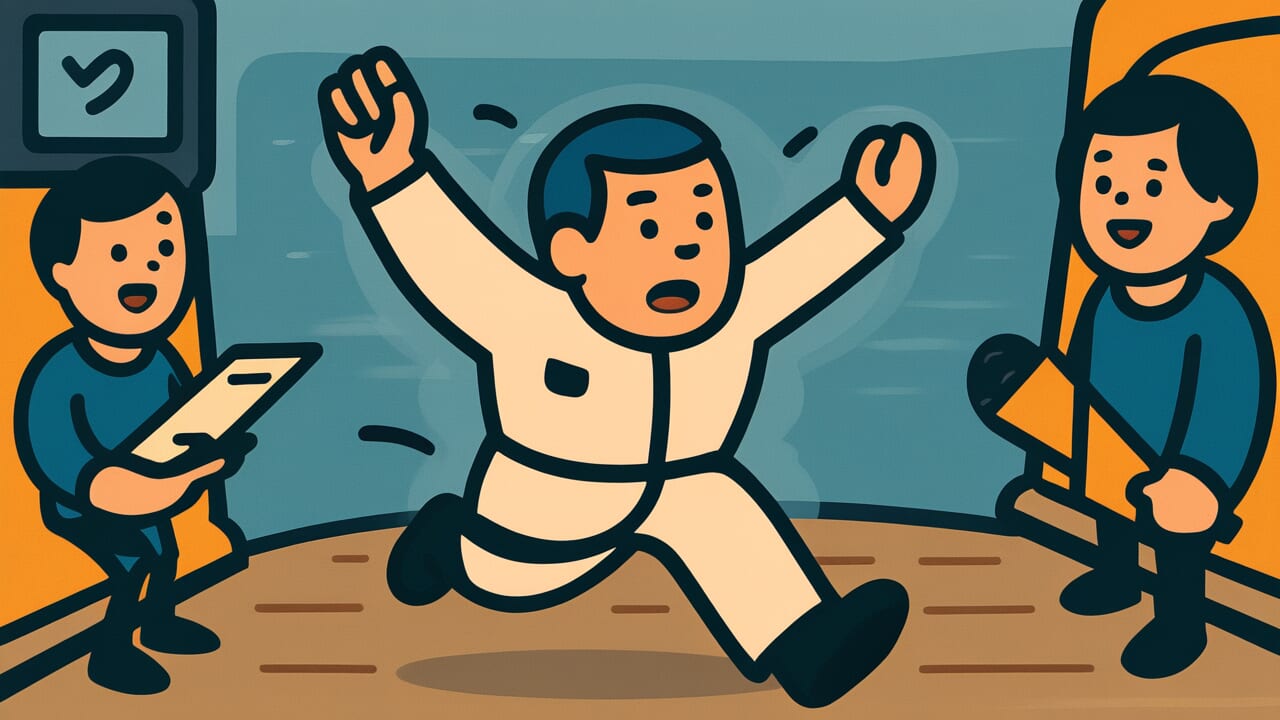How to Read “Doing poorly beats speaking skillfully”
Tsutanaku okonau wa takumi ni iu ni masaru
Meaning of “Doing poorly beats speaking skillfully”
This proverb means that actually taking action, even if your skills are immature and imperfect, is far more valuable than just speaking well without doing anything.
People use this saying when addressing someone who only talks about plans and theories without executing them. It also encourages those who fear failure and cannot take action.
It reflects the reality that someone who clumsily tackles a task produces better results than someone who makes excellent proposals in meetings but never follows through.
Even today, many situations fit this teaching. Think of people who give great presentations but deliver no results. Or those who post inspiring messages on social media but never act.
This proverb conveys the spirit of action-oriented thinking. It teaches that having the courage to execute at seventy percent is more important than doing nothing while aiming for perfection.
Origin and Etymology
Clear documentary records about the origin of this proverb are limited. However, the structure of the phrase offers interesting insights.
The word “tsutanaku” (poorly) is ancient Japanese that describes immature skills or abilities. Meanwhile, “takumi ni” (skillfully) refers to expert techniques or eloquent speech.
This contrasting structure may have been influenced by Chinese classical thought. Specifically, Laozi’s idea that “skillful words and an ingratiating appearance rarely accompany virtue” seems relevant.
Laozi valued people who act honestly over those who speak cleverly.
Japan has long had a belief in the spiritual power of words. Yet there has also been a strong culture of warning against people whose words lack corresponding actions.
During the Heian period, aristocratic society valued poetry and rhetoric skills. But as the warrior class rose to power, the value of “doing rather than saying” grew stronger.
In the Edo period, this spirit became especially important in the worlds of merchants and craftsmen. Apprentice craftsmen were respected for actually creating works despite their inexperience.
They improved their skills through repeated failures. Those who only spoke theories were dismissed as “people of empty words.”
Even clumsy workers who actually moved their hands earned respect. From this culture that emphasized practice, this proverb likely emerged and took root.
Usage Examples
- The proposal isn’t perfect, but doing poorly beats speaking skillfully, so let’s start small and begin
- He’s not good with words but actually produces results—he truly embodies doing poorly beats speaking skillfully
Universal Wisdom
Humans have a strange tendency. We find it easier to talk about taking action than to actually take action. Why is this?
Action always involves risk. We might fail, embarrass ourselves, or face criticism. These fears keep us trapped in the world of words.
In words, we can create perfect plans and imagine ideal outcomes. We cannot get hurt there.
But our ancestors saw through this human weakness. They knew that even the most beautiful words cannot move reality even one millimeter.
On the other hand, people who actually move their hands, sweat, and experiment through trial and error definitely change something. Even their failures accumulate as lessons for next time.
This proverb has been passed down through generations because humans are creatures who easily fall into the “perfectionism trap.”
We pursue ideals so intensely that we cannot take a single step forward. At such moments, these words give us courage.
You don’t need to be perfect—just begin. What truly matters in life is not beautiful theories but the accumulation of messy, practical efforts.
This unchanging truth is what the proverb teaches us.
When AI Hears This
When we compare verbal explanation and actual action as information transmission systems, a decisive difference emerges.
Words certainly have extremely high information compression rates. For example, explaining “how to ride a bicycle” takes only a few hundred words.
But this compression process strips away enormous amounts of information. In Shannon’s information theory, higher compression rates lead to greater reconstruction errors on the receiving end.
This means the “how to ride a bicycle” reconstructed in the listener’s mind likely differs greatly from the sender’s intention.
Meanwhile, actually demonstrating bicycle riding, even clumsily, involves almost no information compression. Countless details become observable in raw form.
Body tilt, pedaling force, balance adjustments—all these information points transfer in observable form. More importantly, action provides immediate feedback.
If you start to fall, your body reacts, and that correction process itself transmits as information to observers. This is exactly like error correction functions in communication systems.
Skillful words reduce information entropy to create orderly explanations. But this process loses the important information of real-world complexity.
Clumsy action transmits everything, including noise, which allows receivers to build understanding that matches reality. From an information fidelity perspective, action wins overwhelmingly.
Lessons for Today
Modern society may be the era that needs this proverb’s teaching most.
With the development of social media and presentation tools, we can now embellish ourselves with words more easily than ever before.
We can articulate grand visions, create beautiful slides, and gather empathy. But hasn’t this convenience actually pushed the first step of action further away?
This proverb gives you the courage to let go of perfectionism. Nobody can do things well from the start.
Everyone goes through a clumsy stage and gradually improves. What matters is whether you can take that clumsy first step.
When you want to start something new, do you postpone it saying “after I study more” or “when I’m better prepared”?
Of course preparation matters, but you learn far more by actually trying. Start small, learn from failures, and improve.
That process brings real growth.
What small action can you take today? It doesn’t need to be perfect or polished.
Just begin. That one step will create tomorrow’s version of you.



Comments